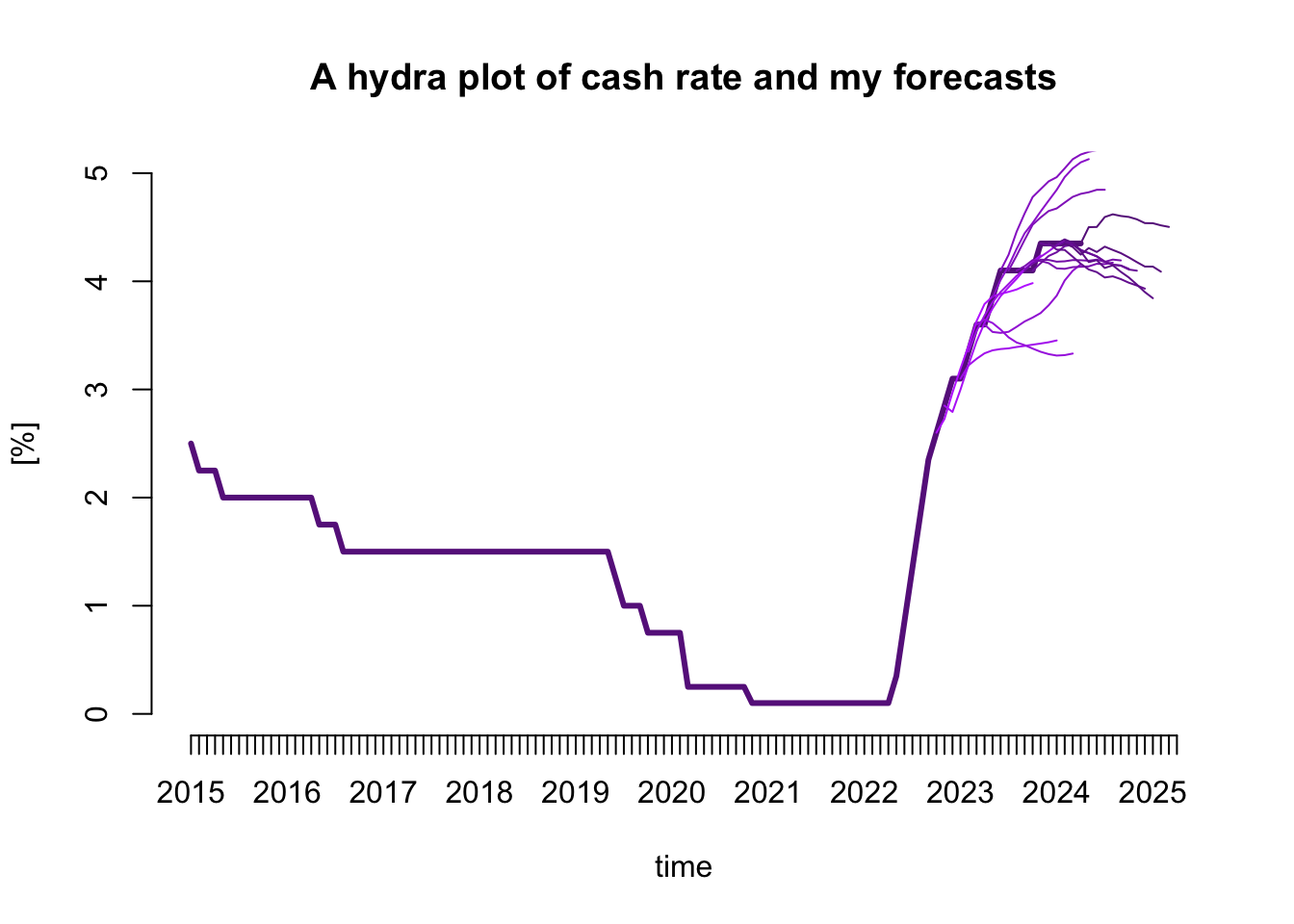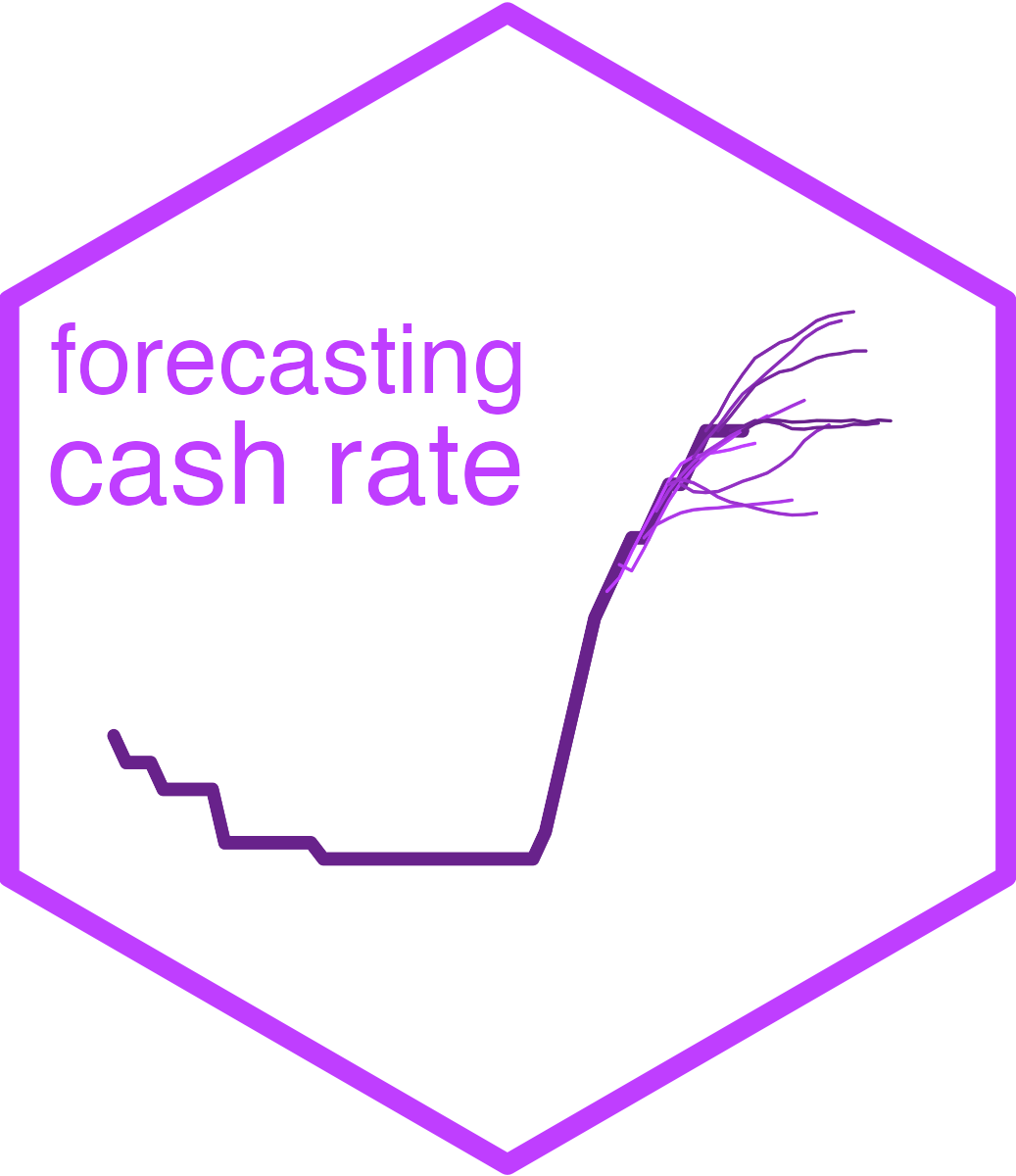
RBA Cash Rate Survey Forecasts
In October 2022, portal finder.com.au invited me to join the panel of economists for their monthly RBA cash rate survey. My answers are be based on the forecasting I perform using various types of variables and predictive models. I am using methods I research and teach in my everyday work at the University of Melbourne.
In the spirit of transparency, reproducibility, and sharing expertise, I am publishing my forecasts, and the survey answers on this website. Please, use the contact details if you want to share your insights, feedback, or suggestions with me.
The most up-to-date forecasts
Have a look at the forecasts generated in February 2026
My cash rate forecasts
The hydra plot below presents monthly cash rate series starting from January 2015 together with my forecasts from the subsequent months.
My answers
The tables below juxtaposes my answers to the survey question regarding the following month’s cash rate change with RBA’s decision.
2026
| Survey taken in: | Feb | Mar | May | Jul | Aug | Sep | Nov | Dec |
|---|---|---|---|---|---|---|---|---|
| Predicted decision | RAISE | |||||||
| Predicted change | 0.12 | |||||||
| RBA’s decision |
2025
| Survey taken in: | Feb | Mar | May | Jul | Aug | Sep | Nov | Dec |
|---|---|---|---|---|---|---|---|---|
| Predicted decision | CUT | HOLD | CUT | CUT | CUT | HOLD | CUT | HOLD |
| Predicted change | -0.10 | -0.03 | -0.13 | -0.15 | -0.13 | 0.02 | -0.09 | 0.06 |
| RBA’s decision | -0.25 | 0.00 | -0.25 | 0.00 | -0.25 | 0.00 | 0.00 | 0.00 |
2024
Starting in 2024 the Predicted change is reported as the difference between the value of cash rate and the mean pooled forecast. This value might not be exactly consistent with the reported Predicted decision as the latter is the interpretation of the former.
| Survey taken in: | Jan | Feb | Mar | Apr | Jun | Aug | Sep | Nov | Dec |
|---|---|---|---|---|---|---|---|---|---|
| Predicted decision | HOLD | HOLD | HOLD | HOLD | HOLD | HOLD | HOLD | HOLD | |
| Predicted change | -0.06 | 0.04 | -0.03 | 0.04 | 0.02 | 0.05 | -0.01 | -0.02 | -0.02 |
| RBA’s decision | 0.00 | 0.00 | 0.00 | 0.00 | 0.00 | 0.00 | 0.00 | 0.00 |
2023
| Survey taken in: | Jan | Feb | Mar | Apr | May | Jun | Jul | Aug | Sep | Oct | Nov |
|---|---|---|---|---|---|---|---|---|---|---|---|
| Predicted decision | RAISE | RAISE | RAISE | RAISE | RAISE | RAISE | RAISE | HOLD | HOLD | HOLD | HOLD |
| Predicted change | +0.25 | +0.15 | +0.15 | +0.15 | +0.15 | +0.15 | +0.15 | 0.00 | 0.00 | 0.00 | 0.00 |
| RBA’s decision | +0.25 | +0.25 | 0.00 | +0.25 | +0.25 | 0.00 | 0.00 | 0.00 | 0.00 | +0.25 | 0.00 |
2022
| Survey taken in: | Jan | Feb | Mar | Apr | May | Jun | Jul | Aug | Sep | Oct | Nov |
|---|---|---|---|---|---|---|---|---|---|---|---|
| Predicted decision | RAISE | RAISE | |||||||||
| Predicted change | +0.5 | +0.25 | |||||||||
| RBA’s decision | +0.25 | +0.25 |
